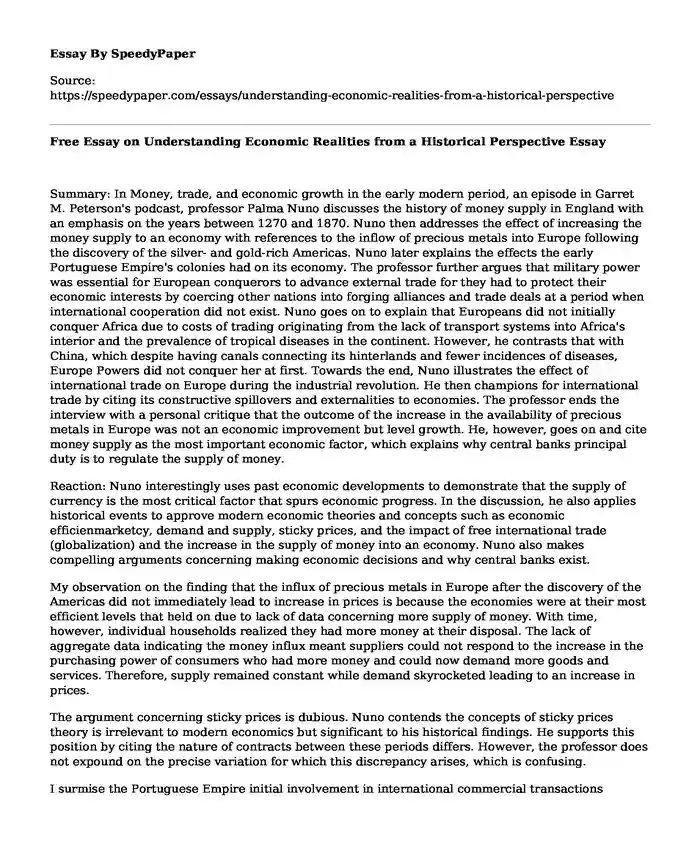Summary: In Money, trade, and economic growth in the early modern period, an episode in Garret M. Peterson's podcast, professor Palma Nuno discusses the history of money supply in England with an emphasis on the years between 1270 and 1870. Nuno then addresses the effect of increasing the money supply to an economy with references to the inflow of precious metals into Europe following the discovery of the silver- and gold-rich Americas. Nuno later explains the effects the early Portuguese Empire's colonies had on its economy. The professor further argues that military power was essential for European conquerors to advance external trade for they had to protect their economic interests by coercing other nations into forging alliances and trade deals at a period when international cooperation did not exist. Nuno goes on to explain that Europeans did not initially conquer Africa due to costs of trading originating from the lack of transport systems into Africa's interior and the prevalence of tropical diseases in the continent. However, he contrasts that with China, which despite having canals connecting its hinterlands and fewer incidences of diseases, Europe Powers did not conquer her at first. Towards the end, Nuno illustrates the effect of international trade on Europe during the industrial revolution. He then champions for international trade by citing its constructive spillovers and externalities to economies. The professor ends the interview with a personal critique that the outcome of the increase in the availability of precious metals in Europe was not an economic improvement but level growth. He, however, goes on and cite money supply as the most important economic factor, which explains why central banks principal duty is to regulate the supply of money.
Reaction: Nuno interestingly uses past economic developments to demonstrate that the supply of currency is the most critical factor that spurs economic progress. In the discussion, he also applies historical events to approve modern economic theories and concepts such as economic efficienmarketcy, demand and supply, sticky prices, and the impact of free international trade (globalization) and the increase in the supply of money into an economy. Nuno also makes compelling arguments concerning making economic decisions and why central banks exist.
My observation on the finding that the influx of precious metals in Europe after the discovery of the Americas did not immediately lead to increase in prices is because the economies were at their most efficient levels that held on due to lack of data concerning more supply of money. With time, however, individual households realized they had more money at their disposal. The lack of aggregate data indicating the money influx meant suppliers could not respond to the increase in the purchasing power of consumers who had more money and could now demand more goods and services. Therefore, supply remained constant while demand skyrocketed leading to an increase in prices.
The argument concerning sticky prices is dubious. Nuno contends the concepts of sticky prices theory is irrelevant to modern economics but significant to his historical findings. He supports this position by citing the nature of contracts between these periods differs. However, the professor does not expound on the precise variation for which this discrepancy arises, which is confusing.
I surmise the Portuguese Empire initial involvement in international commercial transactions inconsequential effect on the country's economy because the public was more interested in internal agricultural output than external trade. As a result, trading did not generate enough monetary transactions to upset the efficiency of the agri-economy.
The contrast that Nuno points out regarding why Europeans powers did not initially conquer China explains the difficulty in making economic decisions. This observation is because such decisions do not entail factoring costs and profits only. In fact, as Peterson quips, other factors such as advanced technology play a significant role. On the same note, it is not surprising the professor concludes that the overwhelming supply of money due to the phenomenon inflow of precious metals into Europe was resulted in a level effect as opposed to economic growth outcome. If economies were all about monetary supply, then the European dominant powers' economies would have violently grown.
In his contention that international commerce is more than just the quantity of trade and the value of money that change hands, I have discovered Nuno is an unfettered champion of globalization. This suggestion is because he deviates from his axiom that money is the most vital aspect for nurturing economic growth to proves this point. His support for free international trade is further exemplified by the argument that war becomes necessary where international cooperation is absent.
I am intrigued by the simplistic, yet effective, reason Nuno gives on why central banks exist - to regulate liquidity. With this explanation, the professor manages to reassert his main argument that the provision of money matters more when it comes to economic growth. Also, by showing that money has always been a vital factor for economic progression, the professor proves that the relevancy of historical economic developments in explaining contemporary economic realities.
Reference
Petersen, G.M. (Host) & Nuno, P (Expert Quest). (2017, June 2). Money, trade, and economic growth in the early modern period [Audio podcast]. Retrieved from http://economicsdetective.com/2017/06/money-trade-economic-growth-early-modern-period-nuno-palma/
Cite this page
Free Essay on Understanding Economic Realities from a Historical Perspective. (2022, Oct 13). Retrieved from https://speedypaper.net/essays/understanding-economic-realities-from-a-historical-perspective
Request Removal
If you are the original author of this essay and no longer wish to have it published on the SpeedyPaper website, please click below to request its removal:
- Free Essay Discussing the Nigerian Taboos from a Comparative Perspective
- Free Essay with Disadvantages of Buying Hybrid Vehicles
- Essay Example on Mall Ethnography
- Business Essay Example for Your Inspiration
- Essay Example on Ethical Leadership and Decision-Making
- Essay Sample on What Is the Relationship Between Composers/songwriters and Performers
- Essay Sample on Personal Twist Fairy Tale
Popular categories





